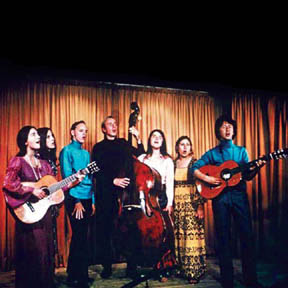

The New Troubadours
History
BRIEF HISTORY
The New Troubadours were a group of friends who came together at the Findhorn spiritual community in
The Troubadours recorded two albums in Findhorn, both released in 1973: Homeland and Love Is. These were issued only on cassette but were kept in catalogue by the community for thirty years, selling many thousands of copies. The band also appeared on several contemporary television and radio programmes about the Findhorn community, including BBC's Mainly Magnus, in January 1973, on which several songs were broadcast.
In 1973 most of the Troubadours relocated to the
NOTES ON THE TROUBADOURS
by David Spangler
The music of the New Troubadours came out of a special time in the history of Findhorn, the international spiritual community in northern
I arrived in the summer of 1970, to discover that I was at the leading edge of a surge of people coming to visit and then to join the community. In a matter of months, the resident population went from fifteen to around a hundred and fifty people all living on one half of a trailer park. Among these newcomers were artists, musicians, actors, and craftmakers. Under their influence the “fun nights” went from being once every other month or so to being weekly events for which individuals prepared musical and comedic performances. Soon people were scheduling rehearsal times into their days.
These fun nights were popular with the many visitors who were coming to the community as well as with the residents. They also provided a neutral and enjoyable way in which people in the nearby towns and villages could interact with the community. There was some suspicion and even hostility towards the community. The local people weren’t sure just who these people talking to nature spirits at the local trailer park, and there was concern that we were a nest of drug-using hippies. Nor did the fact that we referred to ourselves as the Findhorn community sit well with the residents of the Findhorn fishing village nearby who saw themselves as the true Findhorn, not these strange New Agers down the road.
This was the situation in which the New Troubadours were born, initially as a group of friends singing at the fun nights and then as a folk group singing at local events around the area as ambassadors of good will from the community.
Initially our repertoire was composed of traditional folk songs with which people were familiar and could sing along, always a crowd pleaser. But moved by the idea of a New Age and the ecospirituality which Findhorn was exploring, I felt a desire to write new songs that expressed some of the joy and vision we were experiencing in the community. At first with Lark Batteau and then with Milenko Matanovic, I wrote what one friend laughingly called “mini-lectures set to music.” These we performed exclusively at fun nights in the community as a way of celebrating the spirit we were all feeling. Lark and another talented community member, Patti Weber, also wrote songs in this same vein.
Many of these early songs either were not recorded or were recorded in ways that lacked the quality to be included in this CD. The ones that did make it are Change Can Come, the Love Affirmation, Free, Canticle, Happy Song, I Dreamed a Dream, The River, and Winds of Birth.
In 1973, there was an opportunity to develop and present a musical comedy at a conference in
We also wrote a number of Christmas songs for a community winter festival in 1972, which later we collected on an album produced in the
There were other songs I would have liked to have included, but the state of their recording was just not good enough to make the cut. Often we recorded under the most primitive of conditions, without soundproofing. Indeed, one of our favorite stories involved the commander of the nearby Royal Air Force base who was friendly to the community and had invited the New Troubadours to do concerts for the enlisted men and officers. We had a standing offer that we could call him before we were about to record and if he could, he would ground all the planes on the base for a couple of hours so as to minimize the noise, which could be quite loud when the big jets took off and landed. It was true cooperation!
The spirit of the New Troubadours (affectionately called “the Troubs”) was one of fun, laughter, and a joy at the vision of a possible new world and a new consciousness of wholeness evolving within humanity. I think that spirit and joy comes across in our music. We were all young and whatever our deficiencies as musicians we made up for in enthusiasm and a desire to serve through our music. If I have any regrets, it’s that when I wrote so many of the lyrics I was not sensitive to the emerging desire of so many women and men to stop using the word “Man” to mean all humanity. On the other hand, sometimes I simply couldn’t think of another word that rhymed so well and easily.
I’m proud of the work we did and love the songs as much now as when they were first written. The vision and consciousness they celebrate is as real and powerful—and needed—now as it was then.
David Spangler
June, 2008
NEW TROUBADOURS DISCOGRAPHY
Homeland (Findhorn Foundation Music Series, 1973)
Love Is (Findhorn Foundation Music Series, 1973)
Winds Of Birth (Lorian Association, 1974)
Festival Of Light (Lorian Association, 1980)
Music From The Magic Garden (Findhorn, 1995, compliation incl. six Troubadours tracks)